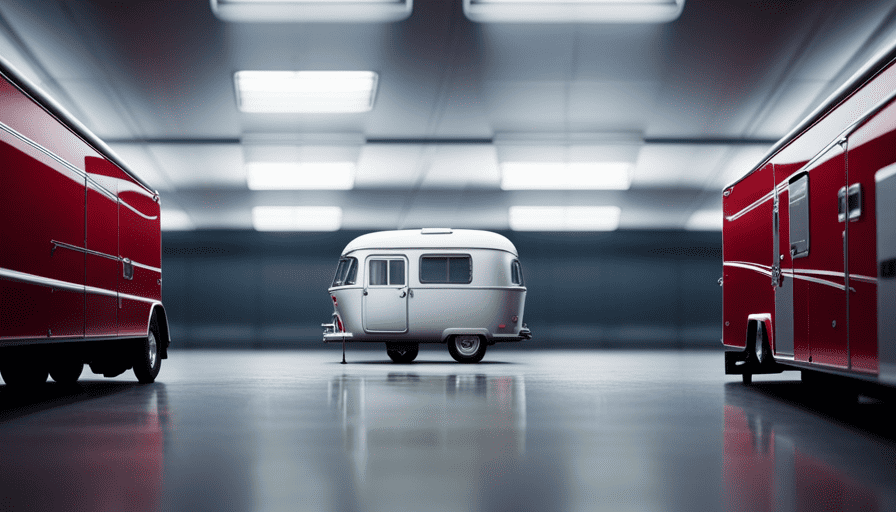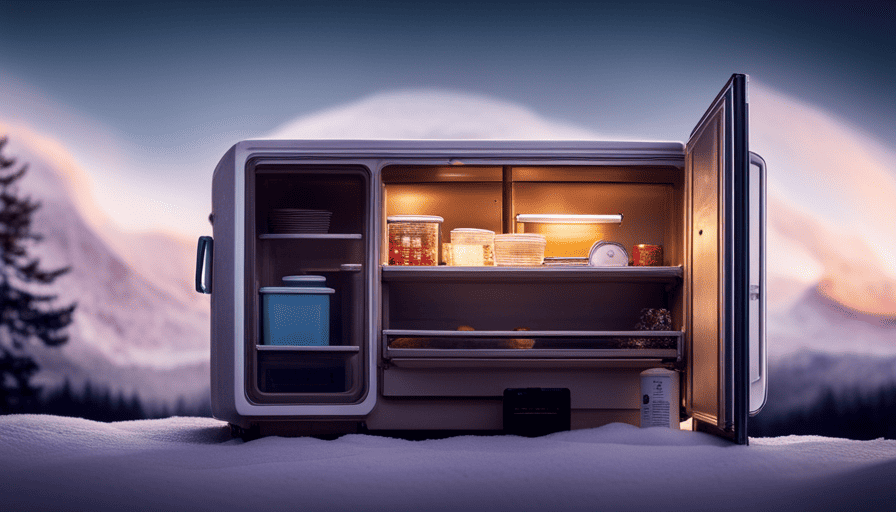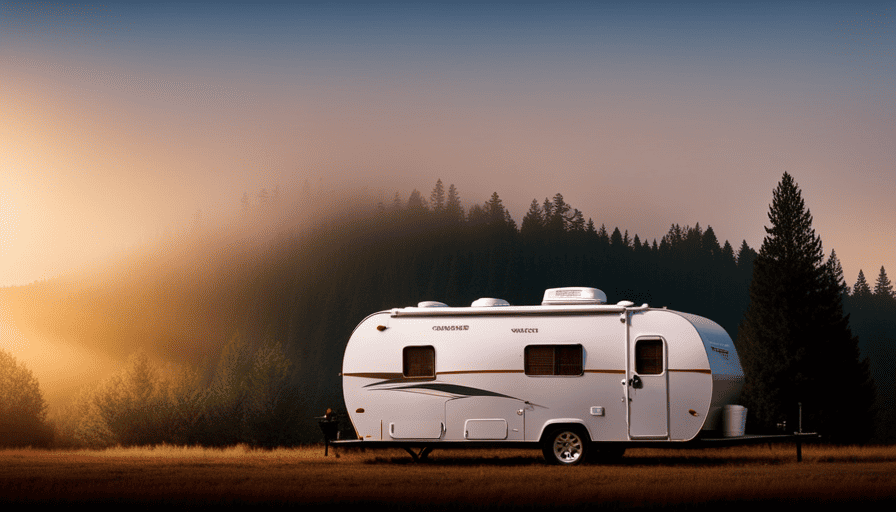Think of your camper trailer as a dependable ally, forever prepared to join you on fresh explorations. As with any faithful companion, it requires adequate maintenance and safeguarding when it’s time to pause from the journeys on the open road.
In this article, we will guide you through the essential steps of storing your camper trailer, ensuring its longevity and readiness for your next exciting journey.
From cleaning and preparing the interior to inspecting and maintaining the mechanical components, we will provide you with detailed instructions on how to keep your trailer in top shape during its time off-duty.
We will also discuss the importance of choosing the right storage location and considering climate control options to safeguard your camper from external elements.
By following these knowledgeable and practical tips, you can rest assured that your camper trailer will be well-preserved and ready to hit the road again when the time comes.
So let’s dive in and discover the secrets to storing your camper trailer like a pro!
Key Takeaways
- Proper cleaning and maintenance of the interior and exterior of the camper trailer is essential for storage.
- Utilize storage bins and containers to keep the camper trailer organized during storage.
- Ensure that water tanks and lines are emptied, cleaned, flushed, and sanitized before storing the camper trailer.
- Prioritize security and choose a suitable storage location with options like RV storage facilities or private storage yards.
Clean and Prepare the Interior of the Camper Trailer
Before you can store your camper trailer, make sure to clean and prepare the interior so it’s ready for future use. Deep cleaning is essential to remove any dirt, dust, and odors that may have accumulated during your trips.
Start by vacuuming the floors and upholstery, paying special attention to hard-to-reach areas. Use a mild detergent and warm water to wipe down all surfaces, including countertops, tables, and cabinets. Don’t forget to clean the windows, blinds, and curtains to let in natural light and fresh air.
Once the interior is clean, it’s time to organize your camper trailer for storage. Utilize storage bins and containers to keep items neatly organized and easily accessible. Consider using stackable drawers or hanging organizers for smaller items. Label each container to quickly identify its contents, making it easier to find what you need when you’re ready to hit the road again.
After deep cleaning and organizing, the next step is to empty and clean all water tanks and lines. Properly draining and flushing the tanks will prevent any water from sitting stagnant and potentially causing damage. This also eliminates the risk of freezing during colder months.
By following these steps, you ensure that your camper trailer is clean, organized, and ready for storage until your next adventure.
Empty and Clean All Water Tanks and Lines
After a camping trip, make sure to flush and sanitize all water tanks and lines in your camper trailer to prevent any potential contamination. This is an essential step to ensure the safety and cleanliness of your water supply for future trips.
Follow these simple steps to properly empty and clean your camper trailer’s water tanks and lines:
-
Start by draining all the water from the tanks. Open the drain valves or faucets and let the water flow out completely.
-
Once the tanks are empty, flush them with clean water. Use a hose to fill the tanks, then open the drain valves or faucets again to let the water out. Repeat this process a couple of times to remove any residue or impurities.
-
Next, remove the water lines from the camper trailer. Disconnect them carefully, ensuring no water spills inside the camper. Inspect the lines for any signs of damage or leaks.
-
Clean the water lines by running clean water through them. Use a specialized RV water line cleaner or a mixture of bleach and water to sanitize the lines. Flush the lines thoroughly to remove any cleaning solution residue.
With the water tanks flushed and the lines cleaned, your camper trailer’s water system is ready for the next adventure.
Now, let’s move on to checking and maintaining the electrical system.
Check and Maintain the Electrical System
Ensuring the safety and functionality of your camping experience, it’s important to regularly check and maintain the electrical system in your camper trailer. The electrical system is a crucial component that powers various appliances and devices during your trips.
To begin, inspecting the wiring is essential. Look for any signs of wear and tear, such as exposed wires or loose connections. Replace any damaged wiring promptly to prevent potential hazards.
Additionally, testing the battery is crucial for a reliable power source. Check the battery voltage using a multimeter and ensure it’s within the recommended range. If the battery is low, recharge it or consider replacing it if it doesn’t hold a charge effectively.
Incorporating these steps into your routine maintenance will help extend the lifespan of your electrical system and prevent unexpected breakdowns during your camping adventures.
Now, let’s transition into the subsequent section about inspecting and servicing the mechanical components to ensure your camper trailer is in top-notch condition.
Inspect and Service the Mechanical Components
To keep your camping adventures running smoothly, make sure to thoroughly inspect and service all the mechanical components of your vehicle. This step is crucial in ensuring the safety and reliability of your camper trailer.
Start by checking the tires for any signs of wear or damage. Inspect the tread depth and ensure proper tire pressure, as this will not only improve fuel efficiency but also enhance the handling and stability of your trailer on the road.
Next, inspect the suspension system, including the shocks and springs. Look for any signs of leakage or damage, and make sure they’re in good working condition. Lubricate any moving parts to prevent rust and ensure smooth operation. Additionally, check the brakes and make sure they’re responsive and not worn out.
Don’t forget to inspect the trailer hitch and coupler. Ensure they’re securely attached and in proper working order. Lubricate the moving parts to prevent rust and ensure smooth operation.
Lastly, inspect the trailer’s electrical system, including the wiring and lights. Make sure all connections are secure and functioning properly.
By thoroughly inspecting and servicing the mechanical components of your camper trailer, you can ensure a safer and more enjoyable camping experience. As we move on to the next section about protecting the exterior of the camper trailer, it’s essential to keep in mind the importance of maintaining the mechanical integrity of your vehicle.
Protect the Exterior of the Camper Trailer
Keeping the exterior of your camper trailer in pristine condition is crucial to ward off the elements and preserve its beauty for years to come. Proper camper trailer maintenance is essential for protecting the paint and ensuring its longevity. Here are four key steps to help you protect the exterior of your camper trailer:
-
Wash Regularly: Regularly wash the exterior of your camper trailer to remove dirt, grime, and road debris. Use a mild soap specifically designed for RVs and a soft brush or sponge to avoid scratching the surface.
-
Wax for Protection: Applying a coat of wax to the camper trailer’s exterior creates a protective barrier against the sun’s rays and other environmental elements. Choose a high-quality RV wax and follow the manufacturer’s instructions for best results.
-
Seal the Seams: Inspect the seams, windows, and doors for any signs of damage or wear. Use appropriate sealants to prevent water leaks and potential damage to the camper trailer’s structure.
-
Cover when not in use: When the camper trailer isn’t in use, consider covering it with a breathable RV cover. This will shield it from harsh weather conditions and UV rays, preventing fading and potential damage.
By following these steps, you can ensure that the exterior of your camper trailer stays protected and in optimal condition. In the next section, we’ll discuss how to cover and secure the camper trailer for long-term storage.
Cover and Secure the Camper Trailer
When you’re ready to protect your camper trailer for long-term storage, don’t forget to cover and secure it properly. Cover maintenance is essential to ensure the exterior of your camper trailer remains in good condition. Choose a cover specifically designed for camper trailers, as it’ll provide the necessary protection against the elements.
Look for a cover that’s made from durable and waterproof material to prevent any moisture from seeping through.
Before covering your camper trailer, make sure it’s clean and dry. Remove any dirt, debris, or bird droppings from the exterior. This’ll prevent any damage or staining that may occur while the trailer’s in storage. Additionally, consider using a wax or sealant to provide an extra layer of protection.
Once your camper trailer is covered, it’s important to secure it properly. Invest in a high-quality lock to deter any potential thieves. Consider using wheel locks to prevent the trailer from being towed away. You can also install an alarm system or motion sensor lights to further enhance security.
When it comes to storing your camper trailer, choosing the right location is crucial. Transitioning into the next section, it’s important to consider factors such as accessibility, climate control, and security measures in place.
Choose the Right Storage Location
Imagine yourself standing at the crossroads, faced with the decision of choosing the perfect sanctuary to safeguard your home away from home. When it comes to storing your camper trailer, security measures and access restrictions are essential factors to consider.
So, where should you store your beloved camper trailer? Let’s explore some options:
-
RV storage facility: These specialized facilities are designed with security in mind, offering features like gated access, surveillance cameras, and on-site staff.
-
Private storage yard: Renting a space in a private storage yard allows you to keep a close eye on your camper trailer while still benefiting from security measures like locked gates.
-
Home storage: If you have enough space, storing your camper trailer at home can be convenient. However, ensure you have proper security measures in place, such as installing a sturdy lock or a surveillance system.
-
Community storage: Some neighborhoods or communities have designated storage areas for camper trailers. These areas often have restricted access and may even be gated.
When considering your storage location, it’s crucial to prioritize security and access restrictions. Once you’ve chosen the right storage location, the next step is to consider climate control options without compromising on protection.
Consider Climate Control Options
If you’re looking to protect your beloved mobile home from extreme temperature fluctuations and humidity levels, considering climate control options is imperative. When it comes to storing your camper trailer, opting for climate controlled storage can make a significant difference in preserving its condition.
These storage units are equipped with heating and cooling systems that maintain a consistent temperature and humidity level throughout the year. This helps prevent damage caused by condensation, mold, and mildew, which can be particularly problematic in regions with high humidity or extreme temperature changes.
In addition to climate controlled storage, there are also insulation options available to further protect your camper trailer. Insulating the walls, floor, and ceiling of your storage unit can help regulate the internal temperature and reduce the impact of external weather conditions. This is especially beneficial if you plan to store your camper trailer for an extended period.
By choosing a climate controlled storage unit and exploring insulation options, you can ensure that your camper trailer remains in top condition, no matter the weather conditions outside. However, it’s important to remember that regular check-ups and maintenance are still necessary to keep your mobile home in optimal shape.
Transitioning into the next section, performing these check-ups and maintenance tasks will help prolong the lifespan of your camper trailer and minimize any potential issues.
Perform Regular Check-ups and Maintenance
Regular check-ups and maintenance are key to ensuring the longevity and optimal condition of your mobile home. By conducting regular maintenance, you can identify and address potential issues before they become major problems. Here are four important reasons why regular check-ups are essential:
-
Preventive Maintenance: Regular inspections allow you to catch any signs of wear and tear early on, preventing costly repairs down the line.
-
Safety: Regularly checking the brakes, tires, and electrical systems ensures that your camper trailer is safe to tow and use, giving you peace of mind during your trips.
-
Efficiency: Regular maintenance, such as cleaning and lubricating moving parts, helps your camper trailer operate smoothly and efficiently, improving fuel economy and performance.
-
Warranty Preservation: Many camper trailer warranties require regular maintenance to remain valid. By keeping up with check-ups, you can avoid potential warranty issues in the future.
Regular maintenance and check-ups are vital to keeping your mobile home in top shape. So, before you embark on your next adventure, make sure to prepare your camper trailer by following these important steps.
Prepare for Your Next Adventure
Get ready for your next adventure by making sure you’re fully prepared to hit the road and enjoy every moment of your journey! When it comes to preparing for your next camper trailer adventure, there are a few key things to keep in mind.
First, make sure you have all the packing essentials you need. This includes items like bedding, cooking utensils, toiletries, and any other personal items you’ll need while on the road.
It’s also important to do some research on campgrounds along your route. Look for campgrounds that offer the amenities you desire, such as electricity, water hookups, and shower facilities. Additionally, consider the location and activities available in the area. Do you want to hike, fish, or simply relax by the lake? Knowing what each campground offers will help you plan your itinerary and make the most of your trip.
So, before you embark on your next adventure, take the time to pack all your essentials and do some research on campgrounds. This way, you’ll be fully prepared to enjoy every moment of your journey.
Frequently Asked Questions
How do I choose the right storage location for my camper trailer?
When choosing a storage location for your camper trailer, it’s crucial to consider various factors.
Firstly, explore different storage options such as outdoor lots, covered facilities, or even renting a garage.
Secondly, prioritize security measures like gated access, surveillance cameras, and on-site staff. These precautions ensure the safety of your camper trailer and give you peace of mind.
Remember to inspect the area for any potential hazards or restrictions before making your final decision.
What are some climate control options to consider when storing my camper trailer?
When considering the best storage location for your camper trailer, it’s important to think about climate control options. Extreme temperatures can damage the interior and exterior of your trailer over time.
Look for storage facilities that offer climate-controlled units or outdoor spaces with shade and ventilation. These options will help protect your trailer from excessive heat or cold.
Additionally, consider using moisture-absorbing products and covering your trailer with a breathable cover to prevent condensation and mold growth.
How often should I perform regular check-ups and maintenance on my camper trailer?
Regular maintenance is an essential aspect of owning a camper trailer. To ensure its optimal performance and longevity, it’s crucial to adhere to a routine inspection schedule.
By conducting regular check-ups, you can identify and address any potential issues promptly. This includes checking the tires, brakes, electrical systems, and plumbing.
Additionally, inspecting the roof, windows, and seals for leaks is vital. Following a consistent maintenance routine will help keep your camper trailer in top shape for all your future adventures.
Can you provide tips on how to cover and secure my camper trailer for long-term storage?
When it comes to covering and securing your camper trailer for long-term storage, winterizing tips are essential.
Did you know that improper storage can result in costly damages and repairs?
To protect your investment, start by thoroughly cleaning the trailer and removing all perishable items.
Then, cover it with a breathable, waterproof cover to prevent moisture buildup.
Secure the cover tightly to prevent it from blowing off in high winds.
Lastly, make sure to use wheel locks and hitch locks for added security.
What steps should I take to prepare my camper trailer for my next adventure after it has been in storage?
To prepare our camper trailer for our next adventure after it’s been in storage, we start by cleaning the exterior thoroughly. This involves washing the trailer and scrubbing away any dirt or grime. We also check for any damage.
Inside, we make sure to remove any items that may have been stored inside and clean the interior thoroughly. This includes vacuuming, wiping down surfaces, and checking for any signs of pests.
By taking these steps, we ensure that our camper trailer is in top condition and ready for our next trip.
What Items Should I Stock in My Camper Trailer for Proper Storage?
Stocking a camper trailer is essential for proper storage. When considering the items to have on hand, it’s important to prioritize functionality and space optimization. Consider including kitchen essentials like cookware and utensils, as well as bedding, toiletries, and emergency supplies. Don’t forget camping gear, outdoor equipment, and a first aid kit. Efficiently stocking your camper trailer ensures a comfortable and prepared adventure on the road.
Conclusion
In conclusion, storing a camper trailer is no small task. It requires careful attention to detail and a bit of elbow grease. By following the steps outlined in this article, we can ensure that our beloved home on wheels remains in tip-top shape during its time in hibernation.
Just like a well-oiled machine, we must clean, inspect, and protect every nook and cranny. So, let’s bid farewell to our trusty companion for now, knowing that we’ve done everything possible to keep it safe and sound until our next grand adventure.










